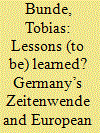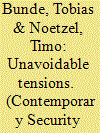| Srl | Item |
| 1 |
ID:
186560


|
|
|
|
|
| Summary/Abstract |
In Germany, the Russian war on Ukraine is widely perceived as a “Zeitenwende,” a watershed moment undermining key foreign policy beliefs. Despite mounting evidence contradicting them, German elites previously failed to adapt core beliefs regarding Russia and the use of force because these beliefs were not only deeply embedded in largely uncontested identity constructions but also shaped the definition of economic interests, which in turn made ideational adaptation more costly. Moreover, Germany’s extraordinarily beneficial geopolitical situation in the post-Cold War era meant that the country could afford not to learn. Although the “Zeitenwende” will trigger significant change, it is unclear which lessons exactly Germans will now be learning and how far that adaptation will go. Given Germany’s key position in Europe and its previous role in shaping the European and transatlantic policy toward Russia, the results of these learning processes will significantly shape the emerging European security order.
|
|
|
|
|
|
|
|
|
|
|
|
|
|
|
|
| 2 |
ID:
098391


|
|
|
|
|
| Publication |
2010.
|
| Summary/Abstract |
The article puts the contemporary debate on NATO 'going global' into its historical and conceptual perspective. Pressure to expand alliance responsibilities is not new, rather it is a fundamental problem of alliance goal setting and legitimacy. The pedigree of concepts like Global NATO can be traced back to earlier attempts at liberal order-building, efforts that have oscillated between universal and exclusive varieties. Recent proposals for the globalization of NATO or the creation of a global organization of democracies may best be understood as an institutional culmination of the liberal critique of universal multilateralism. While going global, taking on ever greater roles and responsibilities, is inconceivable to many alliance members, the liberal tradition makes expansion of alliance roles increasingly hard to resist. Contrary to prevailing continental European wisdom, the article concludes that the existence of a robust reformist tier within NATO as well as major strategic trends will keep the vision of a Global NATO on the agenda of Western security policy. It argues that exploring NATO's contested global question is crucial for the development and definition of the emerging role of the alliance and collective security.
|
|
|
|
|
|
|
|
|
|
|
|
|
|
|
|